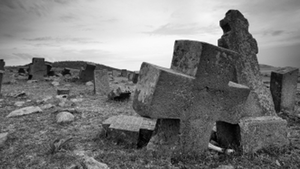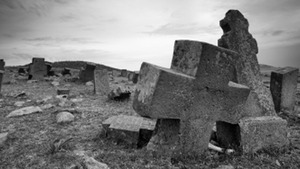Twin caskets lie side by side beneath the cold ground outside my childhood hometown. In one lies my shy, godly father, who, as a teenager during the Great Depression, plowed farm fields 30 kilometres south of here. Beside him rests my mother, who had a less strenuous childhood. In the next town, she had earnestly practised circus horsemanship tricks while herding cows.
“Doesn't it make you feel strange?” my brother asked me on the icy evening after Dad's funeral. “Here we are in this warm loungeroom and he's out there in the cold ground.” Though both of us knew our father could no longer feel the cold, we shuddered—and stared with fascinate into the dark, mysterious afterlife.
What happened to Mum's threering- circus personality? Where is Dad's humble, dependable spirituality?
Are my beloved parents gone forever, like breath on a mirror? Are they disturbed spirits, roaming through some dark forest—and should I be worshipping them and my other ancestors? Or are they somewhere up there, looking down on me, thrilling to my joys and feeling my pain? It's no wonder we're so obsessed with the afterlife. After all, God designed us to live forever. He didn't program our brains to accept death. Death is so unsettling to us that if we don't have facts about what happens next, we quickly invent some. But the good news is that the same God who gave us life tells us clearly what happens when we die.
how we're made
Remember high school algebra? Try to spot the equation in this story prob lem: “And the Lord God formed man of the dust of the ground, and breathed into his nostrils the breath of life; and man became a living being” (Genesis 2:7*).
Do you see the equation? Dust plus breath equals a living being.
Does this formula hold true at life's end? It sure does. “Then the dust will return to the earth as it was, and the spirit will return to God who gave it” (Ecclesiastes 12:7). Dust minus spirit (breath) equals death.
“Hold on a second,” someone says.
“Tell me more about the ‘spirit' that goes back to God. Isn't that the conscious, immortal soul that lives on after the body dies?” That's a good question— but a ticklish one. Not only did God build into our minds a strong “life-wish,” He's also given us an awesome imagination.
Here's another equation: a strong life-wish plus a great imagination equals a powerful “myth factory” if you're not careful. The Bible—as God's description of life given to us—is the safest place to find the truth. And God is clear about what your spirit is and is not.
The apostle Paul makes it clear. He says Jesus Christ is “the King of kings and Lord of lords, who alone has immortality” (1 Timothy 6:15, 16).
So, if God alone has immortality, that means human spirits or souls don't.
Not once does the Bible speak of the soul being immortal, nor does it use the phrase “immortal soul.” Yet, Paul encourages us to seek immortality (see Romans 2:7) and even tells us exactly when this immortality will be given to the faithful seekers— at the Resurrection. “We shall not all sleep,” he says, “but we shall all be changed—in a moment, in the twinkling of an eye, at the last trumpet.
For the trumpet will sound, and the dead will be raised incorruptible, and we shall be changed. For this corruptible must put on incorruption, and this mortal must put on immortality” (1 Corinthians 15:51-53).
But today, 20 centuries later, brows furrow. “Let me get this straight,” someone says. “Does this mean that nobody goes to heaven when they die?”
that's right!
Aside from a few Bible saints, no other human beings have gone to heaven.
We get hints of this surprising truth from one of Peter's sermons. “David,” he says, “did not ascend into the heavens” (Acts 2:34).
The harp-strumming psalm-singer himself knew this, too, because he wrote, “In death there is no remembrance of You; in the grave who will give You thanks?” (Psalm 6:5). Similarly, one of his fellow psalm-writers said, “The dead do not praise the Lord, nor any who go down into silence” (Psalm 115:17).
Solomon says ...
David's son Solomon—the author of Ecclesiastes—was clear about this subject.
“The living know that they will die,” he said, “but the dead know nothing, and they have no more reward, for the memory of them is forgotten. Also their love, their hatred, and their envy have now perished; nevermore will they have a share in anything done under the sun” (Ecclesiastes 9:5, 6).
But, praise God, that's not the end! Back in the most distant reaches of the Old Testament, the truth of the Resurrection shone brightly. “I know that my Redeemer lives,” said Job, “and He shall stand at last on the earth; and after my skin is destroyed, this I know, that in my flesh I shall see God, whom I shall see for myself, and my eyes shall behold, and not another. How my heart yearns within me!” (Job 19:25-27).
Paul says ...
“This we say to you by the word of the Lord,” Paul wrote, “that we who are alive and remain until the coming of the Lord will by no means precede those who are asleep. For the Lord Himself will descend from heaven with a shout, with the voice of an archangel, and with the trumpet of God. And the dead in Christ will rise first. Then we who are alive and remain shall be caught up together with them in the clouds to meet the Lord in the air. And thus we shall always be with the Lord” (1 Thessalonians 4:15-17).
The Bible gives us a real reason for hope as we grieve the loss of our loved ones. Praise God for His wisdom—and His glorious hope!
Jesus says ...
It's fitting that we should give the last word on this subject to our loving Creator, Jesus Himself. What happens when you die? Jesus gave the answer when He learned that Lazarus, a close friend of His, had died: “Our friend Lazarus sleeps,” He told His disciples gently, “‘but I go that I may wake him up.' Then His disciples said, ‘Lord, if he sleeps he will get well.' However, Jesus spoke of his death, but they thought that He was speaking about taking rest in sleep. Then Jesus said to them plainly, ‘Lazarus is dead'” (John 11:11-14).
And, four days later, Jesus stood facing Lazarus's tomb. “Lazarus, come forth!” He called. And Lazarus came to life, blinking in the light and struggling with his grave clothes.
That great Voice gives me hope as I think about those silent coffins beneath the ground, outside my hometown where my parents lie sleeping.
Often, during their days on the farm, they would tumble into a sound sleep after a busy day, knowing nothing until the alarm clock sounded the next morning.
A wise and merciful God has granted them just as dreamless a sleep until the glorious Resurrection morning.
*All biblical quotations are taken from New King James Version of the Bible unless otherwise noted.





